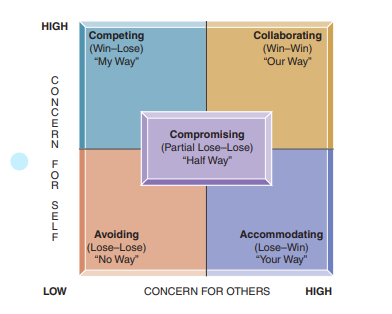Chapter 12
1/14
There's no tags or description
Looks like no tags are added yet.
Name | Mastery | Learn | Test | Matching | Spaced | Call with Kai |
|---|
No analytics yet
Send a link to your students to track their progress
15 Terms
accommodating
A conflict style where you allow others to have their way rather than asserting your own point of view.
avoiding
A conflict style where people non-assertively ignore or stay away from conflict. Avoidance can be physical or conversational.
collaborating
Seeks win–win solutions to conflict. Communicators show a high degree of concern for both themselves and others.
competing
This win–lose approach to conflict involves high concern for self and low concern for others.
complementary conflict style
The partners use different but mutually reinforcing behaviors.
compromising
This conflict style gives both people at least some of what they want, although both sacrifice part of their goals.
conflict
An expressed struggle between at least two interdependent parties who perceive incompatible goals, scarce resources, and interference from the other party in achieving their goals.
conflict ritual
Usually unacknowledged but very real patterns of interlocking behavior.
crazymaking
When people have feelings of resentment, anger, or rage that they are unable or unwilling to express directly. Instead sending aggressive messages in subtle, indirect ways, thus maintaining the front of kindness.
direct aggression
When a communicator expresses a criticism or demand that threatens the face of the person at whom it is directed.
parallel conflict style
Both partners shift between complementary and symmetrical patterns from one issue to another.
passive aggression
When a communicator expresses hostility in an obscure or manipulative way.
relational conflict style
A pattern of managing disagreements.
symmetrical conflict style
Both partners use the same behaviors.
Conflict Styles
Competing: Win-Lose, My way
Collaborating: Win-Win, Our way
Avoiding: Lose-Lose, No way
Accommodating: Lose-Win, Your Way
Compromising: Partial lose-lose, half way
